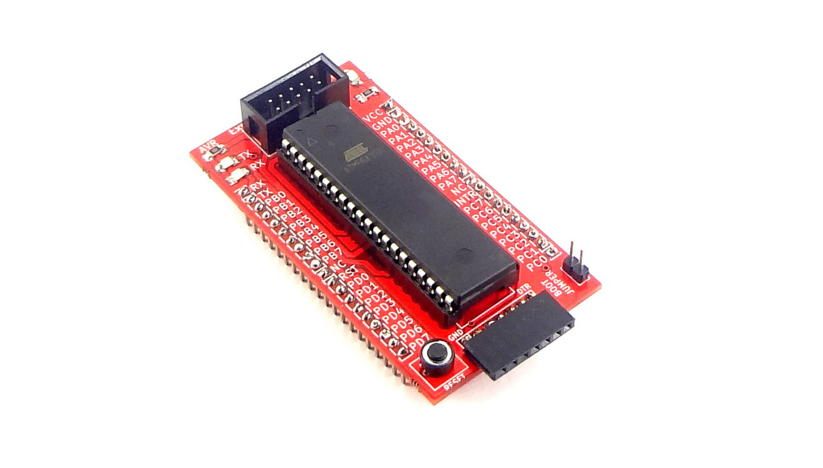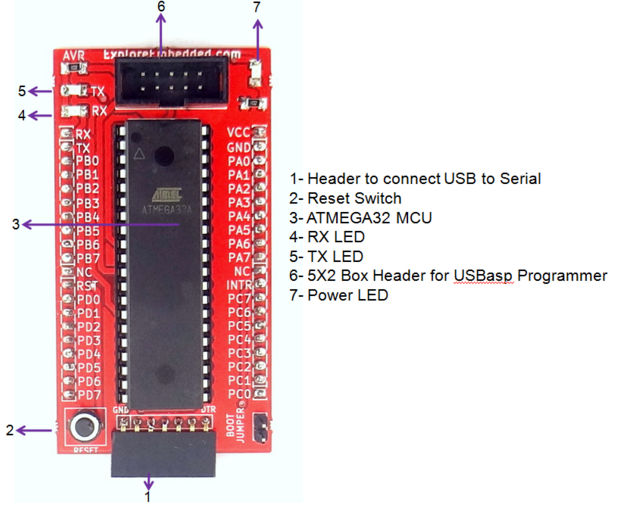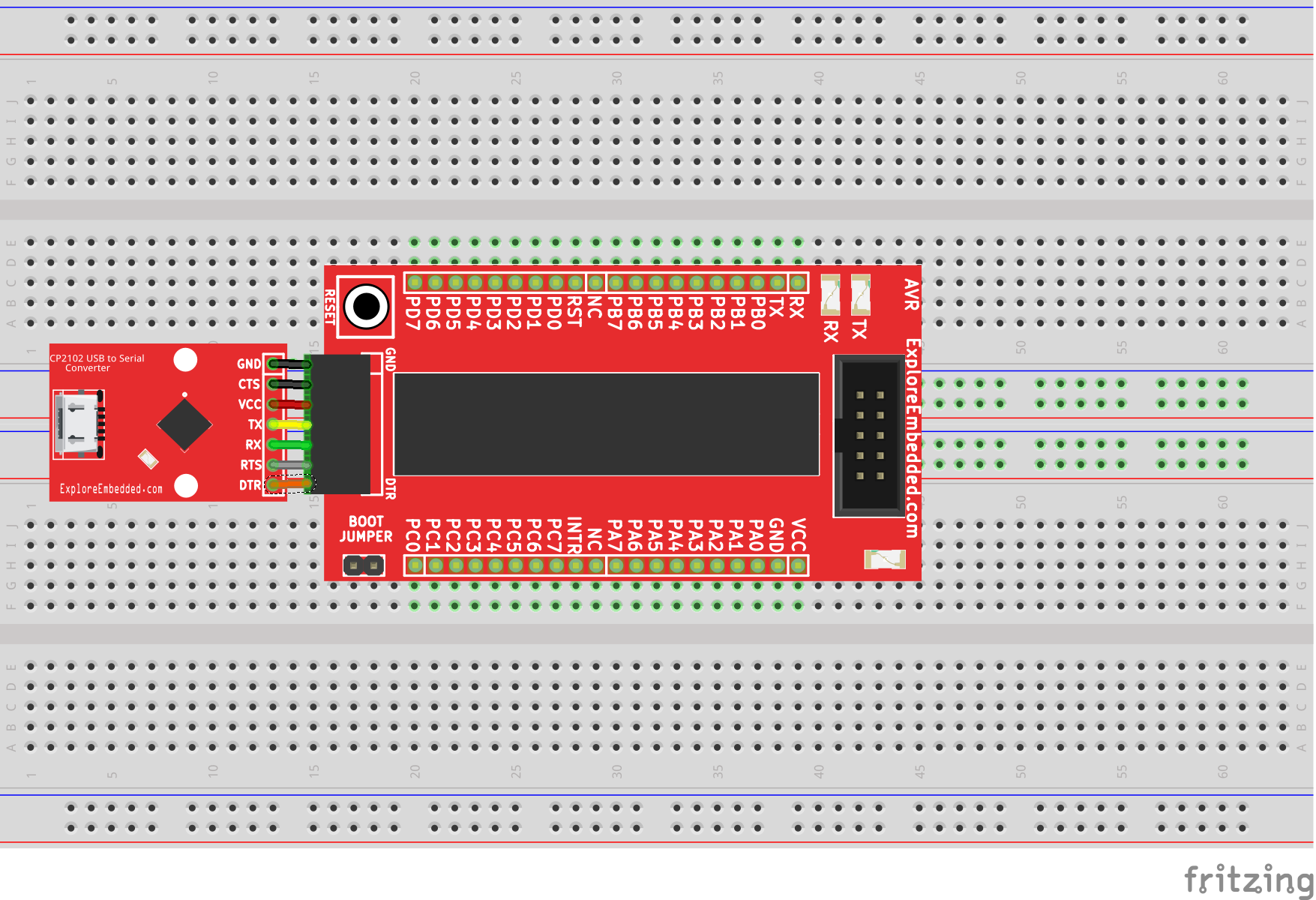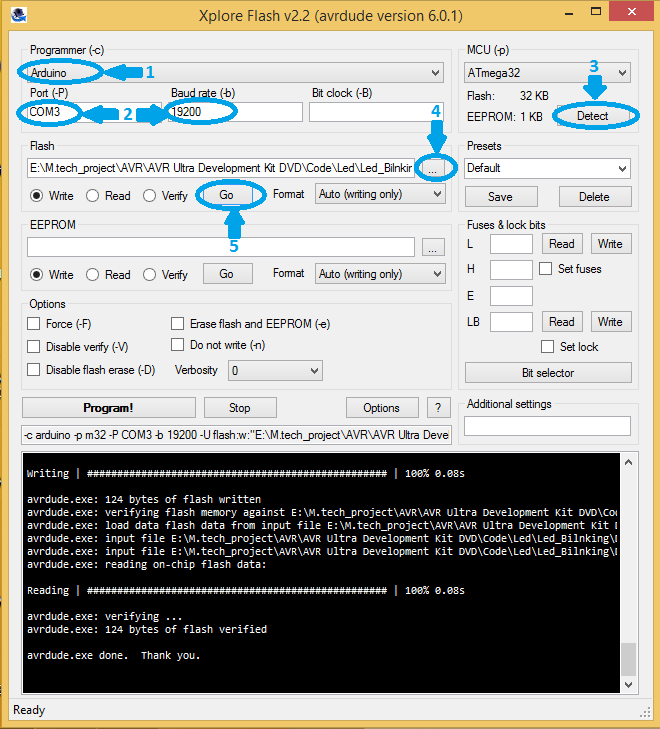Difference between revisions of "Setting Up AVR Breakout"
| (16 intermediate revisions by 2 users not shown) | |||
| Line 1: | Line 1: | ||
[[category:Atmega32 Breakout]] | [[category:Atmega32 Breakout]] | ||
| + | In this tutorial we will look at the basic setup required to get started with AVR breakout board. After completion of this basic setup we can interface peripherals with the breakout board. | ||
| + | [[file:AVR_breakout.PNG]] | ||
| + | =Basics= | ||
| + | The breakout board has ATmega32 MCU with pre-flashed UART bootloader, so it eliminates the need of external programmer. | ||
| + | The AVR 40 pin breakout board can also be used with all AVR 40 pin micro-controllers like ATmega16, ATmega32 etc. | ||
| + | This breakout board comes with male header soldered so it can be fit easily on breadboard and perf board. | ||
| + | Figure below illustrates the various important components on the board. | ||
| + | [[file:1_AVR_breakout.PNG]] | ||
| − | == | + | =HookUp= |
| + | We use the [https://www.exploreembedded.com/product/Explore%20USB%20to%20Serial%20breakout%20(CP2102). external USB to Serial breakout] for flashing the program through serial port. | ||
| + | Connect this breakout to USB to serial header of AVR breakout board indicated as '1' in above diagram. The hookup for USB to Serial is shown below: | ||
| + | |||
| + | [[file:0_AVR_hookup.png]] | ||
| + | |||
| + | =Software Setup= | ||
| + | In this tutorial series we are using [http://exploreembedded.com/wiki/index.php?title=Using_XploreFlash_For_USBasp_based_Programmer Xplore Flash] to transfer the hex file to the target MCU. | ||
| + | ''Steps below show how to trasfer the hex file to the MCU using Xplore Flash.'' | ||
| + | # Open the Xplore Flash and select programmer as '''Arduino''' . | ||
| + | # Connect the AVR breakout board to computer through USB to serial breakout so it will detect as a COM port.Select a COM port and set baud rate '''19200''' . | ||
| + | # Click on "detect" ,it will detect the MCU as '''ATmega32'''. | ||
| + | # After detecting the MCU browse the hex file .'' | ||
| + | # Then just click on '''Go'''. it will erases, Flashes and verifies the hex file. | ||
| + | |||
| + | [[file:xploreflash_6.PNG]] | ||
| + | |||
| + | Checkout the [[Blinky with AVR Breakout ]] tutorial, on how to set up the software, generate a hex file and blink an LED. | ||
| + | |||
| + | {{DISQUS}} | ||
Latest revision as of 18:10, 30 March 2016
In this tutorial we will look at the basic setup required to get started with AVR breakout board. After completion of this basic setup we can interface peripherals with the breakout board.

Basics
The breakout board has ATmega32 MCU with pre-flashed UART bootloader, so it eliminates the need of external programmer.
The AVR 40 pin breakout board can also be used with all AVR 40 pin micro-controllers like ATmega16, ATmega32 etc.
This breakout board comes with male header soldered so it can be fit easily on breadboard and perf board.
Figure below illustrates the various important components on the board.

HookUp
We use the external USB to Serial breakout for flashing the program through serial port. Connect this breakout to USB to serial header of AVR breakout board indicated as '1' in above diagram. The hookup for USB to Serial is shown below:
Software Setup
In this tutorial series we are using Xplore Flash to transfer the hex file to the target MCU. Steps below show how to trasfer the hex file to the MCU using Xplore Flash.
- Open the Xplore Flash and select programmer as Arduino .
- Connect the AVR breakout board to computer through USB to serial breakout so it will detect as a COM port.Select a COM port and set baud rate 19200 .
- Click on "detect" ,it will detect the MCU as ATmega32.
- After detecting the MCU browse the hex file .
- Then just click on Go. it will erases, Flashes and verifies the hex file.
Checkout the Blinky with AVR Breakout tutorial, on how to set up the software, generate a hex file and blink an LED.


